张培基散文佳作108篇
张培基散文佳作108篇
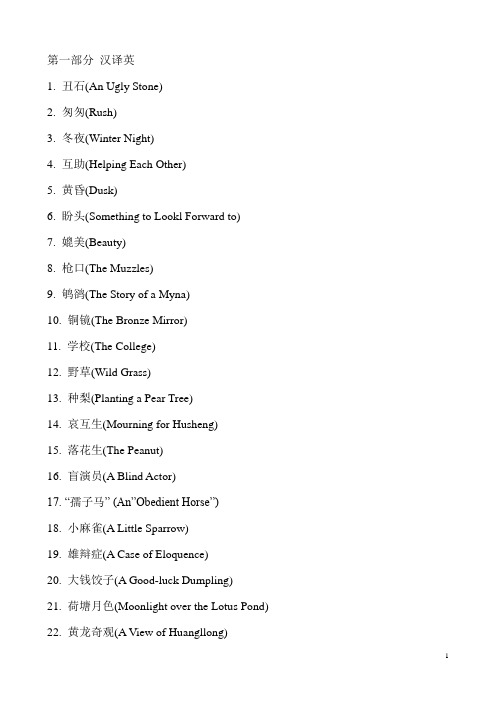
第一部分汉译英1. 丑石(An Ugly Stone)2. 匆匆(Rush)3. 冬夜(Winter Night)4. 互助(Helping Each Other)5. 黄昏(Dusk)6. 盼头(Something to Lookl Forward to)7. 媲美(Beauty)8. 枪口(The Muzzles)9. 鸲鹆(The Story of a Myna)10. 铜镜(The Bronze Mirror)11. 学校(The College)12. 野草(Wild Grass)13. 种梨(Planting a Pear Tree)14. 哀互生(Mourning for Husheng)15. 落花生(The Peanut)16. 盲演员(A Blind Actor)17. “孺子马” (An”Obedient Horse”)18. 小麻雀(A Little Sparrow)19. 雄辩症(A Case of Eloquence)20. 大钱饺子(A Good-luck Dumpling)21. 荷塘月色(Moonlight over the Lotus Pond)22. 黄龙奇观(A View of Huangllong)23. 枯叶蝴蝶(Lappet Butterfies)24. 泡菜坛子(A pickle Pot)25. 田水哗啦(The Irrigation Water Came Gurgling)丑石贾平凹我常常遗憾我家门前的那块丑石呢:它黑黝黝地卧在那里,牛似的模样;谁也不知道是什么时候留在这里的.谁也不去理会它。
只是麦收时节,门前摊了麦子,奶奶总是要说:这块丑石,多碍地面哟,多时把它搬走吧。
(更多翻硕备考文件、真题请移步围脖@资源小巴)于是,伯父家盖房,想以它垒山墙,但苦于它极不规则,没棱角儿,也没平面儿;用赘破开吧,又懒得花那么大气力,因为河滩并不甚远.随便去掬一块回来,哪一块也比它强。
张培基现代散文精选翻译
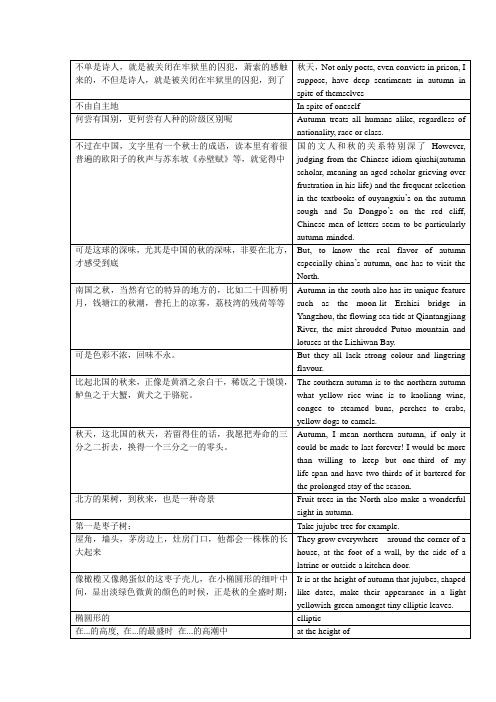
秋天, Not only poets, even convicts in prison, I suppose, have deep sentiments in autumn in spite of themselves In spite of oneself Autumn treats all humans alike, regardless of nationality, race or class. 国 的 文 人 和 秋 的 关 系 特 别 深 了 However, judging from the Chinese idiom qiushi(autumn scholar, meaning an aged scholar grieving over frustration in his life) and the frequent selection in the textbooks of ouyangxiu’s on the autumn sough and Su Dongpo’s on the red cliff, Chinese men of letters seem to be particularly autumn-minded.
无论在什么地方 在南方时非要上郊外获山上去才听得到。
这秋蝉的嘶叫,在北平和蟋蟀耗子一样,简直是家家户 户都养在家里的家虫。
household like crickets or mice v.住在...外, 靠...生活 还有秋雨哩,北方的秋雨,也似乎比南方的下的奇,下 得有味,下得更像样 live off As for the autumn rains in the north, they also seem to differ from those in the south, being more appealing, more temperate A sudden gust of wind under the slaty sky, and raindrops will start pitter-pattering. Soon when the rain is over, the clouds begin gradually to roll towards the west and the sun comes out in the blue sky. Some idle townsfolk, wearing lined or unlined clothing made of thick cloth, will come out pipe in mouth and, loitering under a tree by the end of a bridge, loiter exchange leisurely conversation with acquaintances with a slight touch of regret at the passing of time: a touch of Oh, real nice and cool! Sure! Getting cooler with each autumn shower! Suppose you put up in a humble rented house inside the imperial city, you can, on getting up at dawn, put up in sit in your courtyard sipping a cup of strong tea, leisurely watch the high azure skies and listen to pigeons circling overhead. Saunter eastward under locust trees to closely observe streaks of sunlight filtering through their foliage, or quietly watch the trumpet-shaped blue flowers of morning glories climbing half way up a dilapidated wall, As to morning glories, I like their blue or white flowers best, dark purple ones second best, and pink ones third best. As to It will be most desirable to have them set off by some tall thin grass planted underneath here and there. set off Locust trees in the North, as a decorative embellishment of nature, also associate us with
落花生原文和译文

落花生我们屋后有半亩隙地。
母亲说,“让它荒芜着怪可惜,既然你们那么爱吃花生,就辟来做花生园罢。
”我们几姊弟和几个小丫头都很喜欢——买种的买种,动土的动土,灌园的灌园;过不了几个月,居然收获了!妈妈说:“今晚我们可以做一个收获节,也请你们爹爹来尝尝我们底新花生,如何?”我们都答应了。
母亲把花生做成好几样的食品,还吩咐这节期要在园里底茅亭举行。
那晚上底天色不太好,可是爹爹也到来,实在很难得!爹爹说:“你们爱吃花生么?”我们都争着答应:“爱!”“谁能把花生底好处说出来?”姊姊说:“花生底气味很美。
”哥哥说:“花生可以制油。
”我说:“无论何等人都可以用贱价买它来吃;都喜欢吃它。
这就是它的好处。
”爹爹说:“花生底用处固然很多;但有一样是很可贵的。
这小小的豆不像那好看的苹果、桃子、石榴,把它们底果实悬在枝上,鲜红嫩绿的颜色,令人一望而发生羡慕的心。
它只把果子埋在地底,等到成熟,才容人把它挖出来。
你们偶然看见一棵花生瑟缩地长在地上,不能立刻辨出它有没有果实,非得等到你接触它才能知道。
”我们都说:“是的。
”母亲也点头。
爹爹接下去说:“所以你们要像花生,因为它是有用的,不是伟大、好看的东西。
”我说:“那么,人要做有用的人,不要做伟大、体面的人了。
”爹爹说:“这是我对于你们的希望。
”我们谈到夜阑才散,所以花生食品虽然没有了,然而父亲底话现在还印在我心版上。
【译文】译文1为张培基译,选自张培基译注,1999年,《英译中国现代散文选》(汉英对照),上海:上海外语教育出版社。
PeanutsBehind our house there lay half a mu of vacant land. Mother said, "It's a pity to let it lie waste. Since you all like to eat peanuts so much, why not have them planted here. " That exhilarated us children and our servant girls as well, and soon we started buying seeds , ploughing the land and watering the plants . We gathered in a good harvest just after a couple of months !Mother said, "How about giving a party this evening to celebrate the harvest and invite your Daddy to have a taste of our newly-harvested peanuts?" We all agreed.Mother made quite a few varieties of goodies out of the peanuts, and told us that the party would be held in the thatched pavilion on the peanut plot.It looked like rain that evening, yet, to our great joy, Father came nevertheless."Do you like peanuts?" asked Father."Yes, we do! " We vied in giving the answer."Which of you could name the good things in peanuts?""Peanuts taste good , " said my elder sister."Peanuts produce edible oil, " said my elder brother."Peanuts are so cheap, " said I, "that anyone can afford to eat them. Peanuts are everyone's favourite . That's why we call peanuts good. ""It's true that peanuts have many uses, " said Father, "but they're most beloved in one respect. Unlike nice-looking apple, peaches and pomegranates, which hang their fruit on branchesand win people's instant admiration with their brilliant colours, tiny little peanuts bury themselves underground and remain unearthed until they're ripe . When you come upon a peanut plant lying curled up on the ground, you can never immediately tell whether or not it bears any nuts until you touch them. ""That's true," we said in unison. Mother also nodded. "So you must take after peanuts," Father continued , " because they're useful though not great and nice-looking. ""Then you mean one should be useful rather than great and nice-looking, " I said ."That's what I expect of you, " Father concluded .We kept chatting until the party broke up late at night. Today, though nothing is left of the goodi es made of peanuts, Father’s words remain engraved in my mind.译文2为刘士聪译,选自乔萍、翟淑蓉、宋洪玮编著,1999年,《散文佳作108篇》(汉英/英汉对照),南京:译林出版社。
散文张培基乌篷船

散文张培基乌篷船一条曲曲折折,蜿蜿蜒蜒的西江在粤中大地上延伸,流淌。
世世代代,祖祖辈辈的哺育着江两岸的普通人家。
我是一个普通人家里的孩子,那汪清莹,碧绿的江水,自我能记事的那天起便是那么迅速的,静静的走进了我的记忆,流入我的生命,使我的一生与它结下不解之缘。
和许多沿江居住的普通一样,我家的日子并不宽裕,父亲读的书不多,且无一技之长,到城里打工,不久便发觉呆不下去,只好返回家,秉承祖辈打鱼的旧业,去勉强完成一个男人养家糊口的责任与义务。
为了使家里人能生活的好,父亲总是很勤劳的捕鱼。
每天清晨,他便拿着鱼网,带着鱼筐,步向那汪西江水,开始他一天的工作,撒网,收网,然后把捕获的鱼倒入筐中,就这样,折腾一天,父亲总能得到好的收获,那进我和小妹都很小,帮不上忙,只能呆呆地趴在窗台上,看父亲在江上捕鱼的背影。
见父亲满载而归时,我们便从屋里跑出,企图以我们微弱的力量帮父亲提鱼,每到这时,父亲那被江风和岁月不断雕塑而布满苍桑的面孔会浮起一丝丝欣慰的笑容,但又略带紧张的说:小心,不要把鱼筐弄翻了。
此时,母亲已把鱼网晒开走了回来,微笑着从我们手里拿过鱼筐,并说:傻孩子,别添乱。
晚上,我们一家便围在一起,把大小不同的鱼分开,第二天一大早,母亲便拿着鱼到集市卖,挣得家用,而父亲便又拿起那鱼网,开始新一轮的工作,在那段年月里,我们一家虽然过着并不富裕的日子,但我们的生活却时时刻刻都洋溢着令人心醉的温馨亲情和知足常乐。
日子就这样,如西江水般静静流淌,后来,我和小妹都上学了,面对徒然增加的教育开支,父亲只好咬咬牙,更加起早摸黑的捕鱼,而此刻,长年的劳苦,终于将母亲本来很健硕的身体拖跨,更糟糕的是,父亲最近捕的鱼也越来越少,原来他一向只在岸边捕鱼,范围有限,多年来,近似无休止的捕获,在岸边生活的鱼基本上都捞上岸了,村里人一直在劝父亲要有一,但由于家里积蓄不多,父亲都拒绝了,而这一下子,我和小妹的学费、母亲体弱我多病的医疗及家庭的日常开支,一切与钱挂上钩的问题接踵而来,冲击着这个本来就已经脆弱的家庭,而我们一家原来幸福的生活也掀起了波澜,变得难以平静此刻,父亲一语不说,呆坐在一边,默默的吸着他的旱烟,以前他并无这一习惯,也许生活的太多无奈,使他只能靠在阵阵烟圈中寻求安慰和解脱,就这样,沉默了许久,父亲最后还是站起来,大声说:我要有一只船,我要有一只船!第二天,父亲拿出家里仅有的积蓄,跑到城里,买了一些木材和几块乌篷。
翻译硕士张培基散文选:长寿之道
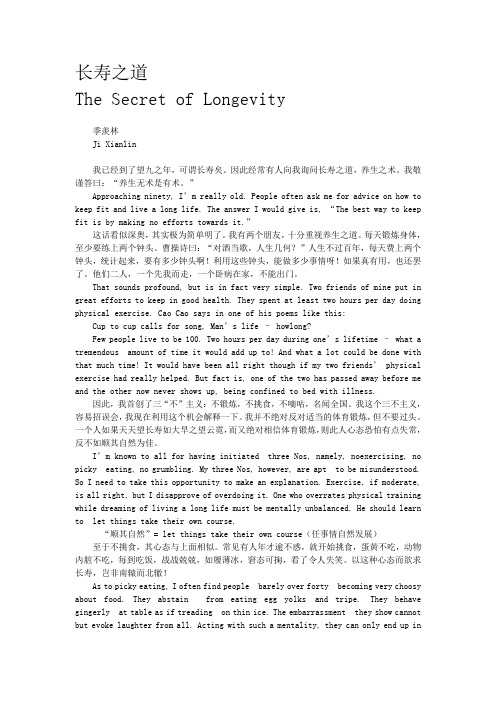
长寿之道The Secret of Longevity季羡林Ji Xianlin我已经到了望九之年,可谓长寿矣。
因此经常有人向我询问长寿之道,养生之术。
我敬谨答曰:“养生无术是有术。
”Approaching ninety, I’m really old. People often ask me for advice on how to keep fit and live a long life. The answer I would give is, “The best way to keep fit is by making no efforts towards it.”这话看似深奥,其实极为简单明了。
我有两个朋友,十分重视养生之道。
每天锻炼身体,至少要练上两个钟头。
曹操诗曰:“对酒当歌,人生几何?”人生不过百年,每天费上两个钟头,统计起来,要有多少钟头啊!利用这些钟头,能做多少事情呀!如果真有用,也还罢了。
他们二人,一个先我而走,一个卧病在家,不能出门。
That sounds profound, but is in fact very simple. Two friends of mine put in great efforts to keep in good health. They spent at least two hours per day doing physical exercise. Cao Cao says in one of his poems like this:Cup to cup calls for song, Man’s life – howlong?Few people live to be 100. Two hours per day during one’s lifetime – what a tremendous amount of time it would add up to! And what a lot could be done with that much time! It would have been all right though if my two friends’ physical exercise had really helped. But fact is, one of the two has passed away before me and the other now never shows up, being confined to bed with illness.因此,我首创了三“不”主义:不锻炼,不挑食,不嘀咕,名闻全国。
上海外国语大学考研:如何复习《张培基散文集》和《散文佳作108篇》
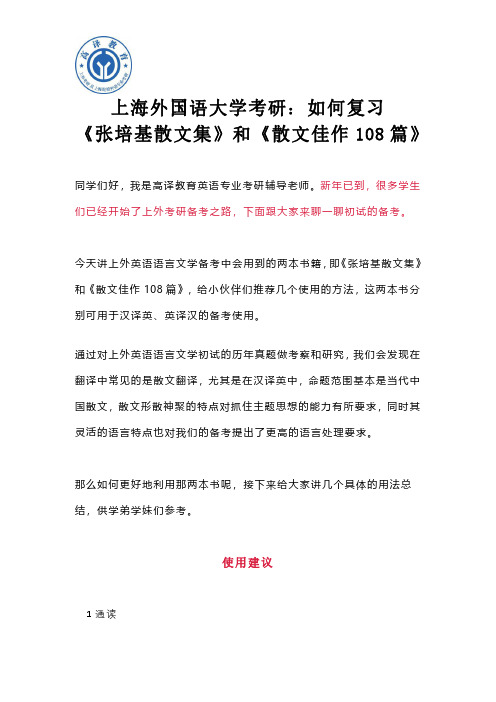
上海外国语大学考研:如何复习《张培基散文集》和《散文佳作108篇》同学们好,我是高译教育英语专业考研辅导老师。
新年已到,很多学生们已经开始了上外考研备考之路,下面跟大家来聊一聊初试的备考。
今天讲上外英语语言文学备考中会用到的两本书籍,即《张培基散文集》和《散文佳作108篇》,给小伙伴们推荐几个使用的方法,这两本书分别可用于汉译英、英译汉的备考使用。
通过对上外英语语言文学初试的历年真题做考察和研究,我们会发现在翻译中常见的是散文翻译,尤其是在汉译英中,命题范围基本是当代中国散文,散文形散神聚的特点对抓住主题思想的能力有所要求,同时其灵活的语言特点也对我们的备考提出了更高的语言处理要求。
那么如何更好地利用那两本书呢,接下来给大家讲几个具体的用法总结,供学弟学妹们参考。
使用建议1通读进行任何翻译之前首先要做的是对全文做通篇阅读,通过阅读掌握文章的行文风格、语言特点、主题思想,只有先准确抓住中心思想,才可能体会作者的真情实意,才能够读出原文的言外之意,继而在翻译过程中能够及时准确地补充字句,有些地方也才能够精简地表达。
由此看来,在备考翻译这一门时必须先提升自身的文学素养,而文学素养的提升没有捷径,只有通过大量的输入,广泛阅读,不断积少成多,慢慢提高对文章的理解。
对于这两套书,大家首先要做的就是作为阅读材料,对每一篇文章进行精读,养成良好的阅读习惯:通篇阅读,进行分段,提炼出主题思想,用一句话总结出作者的根本观点,并且写下文章的风格和语言特点。
每天至少要读2篇,在八月之前将材料至少通读过一遍。
具体怎么读呢?以《散文佳作108篇》的《风筝》为例,我们可以取其中一个句子来进行阅读和翻译——北京的冬季,地上还有积雪,灰黑色的秃树枝丫叉于晴朗的天空中,而远处有一二风筝浮动,在我是一种惊异和悲哀。
In the winter of Beijing,with snow still on the ground and dark-gray branches up in the brisk air,a couple of kites werefluttering up in the distance against the sunny sky-a sight that filled me with amazement and forlornness.【刘士聪译】解析:原文“北京的冬季”,地上的积雪,“晴朗的天空”,“灰黑色的秃树枝丫”和远处浮动的“风筝”,构成一幅北京残冬的画面,使作者想起童年的往事,因而感到“惊异和悲哀”。
张培基英语散文5
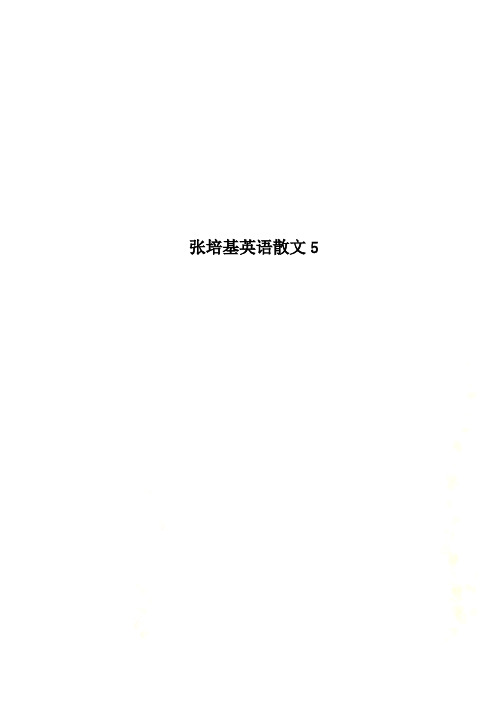
张培基英语散文5《再说包装》(节录)吴冠中More on Packaging (Excerpt)Wu Guanzhong包装的本质是伪装。
Basically, packaging means false embellishment.要点:“伪装”在本文中应理解为“错误的装饰”,因此译为false embellishment.为了美观,略施装饰,无可厚非,斥之伪,有点刻薄。
商品离不开包装,离谱的包装,岂止伪,存心欺蒙顾客。
日本人很讲究包装,一个漂亮的大匣里面藏着精致的小匣,小匣里还有更小的匣,一层层的包装待你剥到底,最后裸露的往往只是一块小小的糖果。
Nevertheless, a little embellishment for the sake of nice appearance is not altogether inadvisable, and it is a bit harsh to denounce it as falsehood. Merchandise can never do without packaging, but going too far with it means something worse than falsehood—it is deliberate cheating. Japanese are very particular about packaging. Hidden inside one beautiful big box will be a number of gradually smaller delicate ones placed one inside another. You have to tear them off one by one until you finally hit on nothing but a tiny piece ofcandy.要点:1,此处的“无可厚非”,并没有译为beyond reproach,但此词的语气稍重,因此改译为is not altogether inadvisable2,“离谱的包装”即“过分的包装”,译为going too far with it,或overdoing it, toomuch of it3,“一个漂亮的大匣里面藏着精致的小匣,小匣里还有更小的匣”译为Hiddeninside one beautiful big box will be a number of gradually smaller delicate ones placed one inside another. 这种表方位的“有”字句,很容易译为there be,这种译法更加突出主语,值得学习!综述:注意第三点省去there be的用法我们进入了包装的时代,这恰好提醒我们进入了伪劣假冒的时代。
张培基散文佳作108篇详解
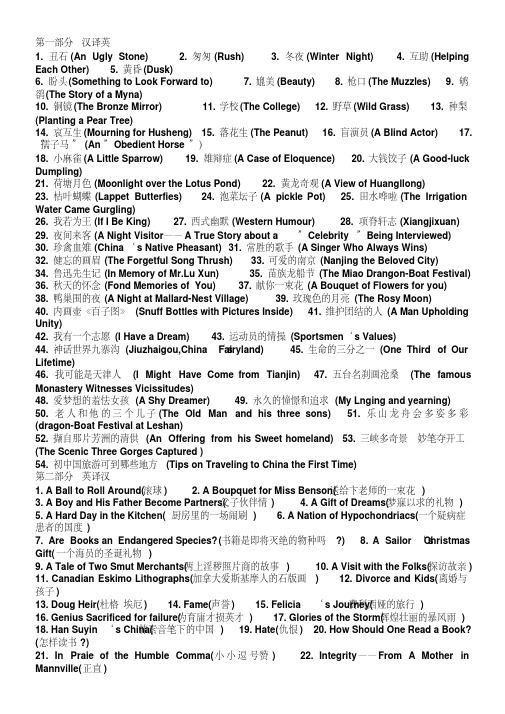
第一部分汉译英1. 丑石(An Ugly Stone)2. 匆匆(Rush)3. 冬夜(Winter Night)4. 互助(Helping Each Other)5. 黄昏(Dusk)6. 盼头(Something to Look Forward to)7. 媲美(Beauty)8. 枪口(The Muzzles)9. 鸲鹆(The Story of a Myna)10. 铜镜(The Bronze Mirror) 11. 学校(The College) 12. 野草(Wild Grass) 13. 种梨(Planting a Pear Tree)14. 哀互生(Mourning for Husheng) 15. 落花生(The Peanut) 16. 盲演员(A Blind Actor) 17. “孺子马” (An”Obedient Horse”)18. 小麻雀(A Little Sparrow) 19. 雄辩症(A Case of Eloquence) 20. 大钱饺子(A Good-luck Dumpling)21. 荷塘月色(Moonlight over the Lotus Pond) 22. 黄龙奇观(A View of Huangllong)23. 枯叶蝴蝶(Lappet Butterfies) 24. 泡菜坛子(A pickle Pot) 25. 田水哗啦(The Irrigation Water Came Gurgling)26. 我若为王(If I Be King) 27. 西式幽默(Western Humour) 28. 项脊轩志(Xiangjixuan)29. 夜间来客(A Night Visitor——A True Story about a ”Celebrity”Being Interviewed)30. 珍禽血雉(China‘s Native Pheasant)31. 常胜的歌手(A Singer Who Always Wins)32. 健忘的画眉(The Forgetful Song Thrush) 33. 可爱的南京(Nanjing the Beloved City)34. 鲁迅先生记(In Memory of Mr.Lu Xun) 35. 苗族龙船节(The Miao Drangon-Boat Festival) 36. 秋天的怀念(Fond Memories of You) 37. 献你一束花(A Bouquet of Flowers for you)38. 鸭巢围的夜(A Night at Mallard-Nest Village) 39. 玫瑰色的月亮(The Rosy Moon)40. 内画壶《百子图》(Snuff Bottles with Pictures Inside) 41. 维护团结的人(A Man Upholding Unity)42. 我有一个志愿(I Have a Dream) 43. 运动员的情操(Sportsmen‘s Values)Fairyland)45. 生命的三分之一(One Third of Our 44. 神话世界九寨沟(Jiuzhaigou,China‘sLifetime)46. 我可能是天津人(I Might Have Come from Tianjin) 47. 五台名刹画沧桑(The famous Monastery Witnesses Vicissitudes)48. 爱梦想的羞怯女孩(A Shy Dreamer) 49. 永久的憧憬和追求(My Lnging and yearning) 50. 老人和他的三个儿子(The Old Man and his three sons) 51. 乐山龙舟会多姿多彩(dragon-Boat Festival at Leshan)52. 撷自那片芳洲的清供(An Offering from his Sweet homeland) 53. 三峡多奇景妙笔夺开工(The Scenic Three Gorges Captured )54. 初中国旅游可到哪些地方(Tips on Traveling to China the First Time)第二部分英译汉1. A Ball to Roll Around(滚球)2. A Boupquet for Miss Benson(送给卞老师的一束花)3. A Boy and His Father Become Partners(父子伙伴情)4. A Gift of Dreams(梦寐以求的礼物)5. A Hard Day in the Kitchen(厨房里的一场闹刷)6. A Nation of Hypochondriacs(一个疑病症患者的国度)Christmas 7. Are Books an Endangered Species? (书籍是即将灭绝的物种吗?) 8. A Sailor‘sGift(一个海员的圣诞礼物)9. A Tale of Two Smut Merchants(两上淫秽照片商的故事) 10. A Visit with the Folks(探访故亲) 11. Canadian Eskimo Lithographs(加拿大爱斯基摩人的石版画) 12. Divorce and Kids(离婚与孩子)费利西娅的旅行)13. Doug Heir(杜格·埃厄) 14. Fame(声誉) 15. Felicia‘s Journey(16. Genius Sacrificed for failure(为育庸才损英才) 17. Glories of the Storm(辉煌壮丽的暴风雨)韩素音笔下的中国) 19. Hate(仇恨) 20. How Should One Read a Book?18. Han Suyin‘s China((怎样读书?)21. In Praie of the Humble Comma(小小逗号赞) 22. Integrity——From A Mother in Mannville(正直)23. In the Pursuit of a Haunting and Timeless Truth(追寻一段永世难忘的史实)24. Killer on Wings is Under Threat(飞翔的杀手正受到威胁) 25. Life in a Violin Case(琴匣子中的生趣)26. Love Is Not like Merchandise(爱情不是商品) 27. Luck(好运气) 28. Mayhew(生活的道路)29. My Averae Uncle(艾默大叔——一个普通人) 30. My Father‘s Music(我父亲的音乐) 31. My Mother‘s Gift (母亲的礼物)32. New Light Buld Offers Energy Efficiency(新型灯泡提高能效) 33. Of Studies(谈读书)34. On Leadership(论领导) 35. On Cottages in General(农舍概述) 36. Over the Hill(开小差) 37. Promise of Bluebirds(蓝知更鸟的希望) 38. Stories on a Headboard(床头板上故事多)39. Sunday(星期天) 40. The Blanket(一条毛毯) 41. The Colour of the Sky(天空的色彩) 42. The date Father Didn‘t Keep(父亲失约) 43. The Kiss(吻) 44. The Letter(家书)45. The Little Boat That Sailed through Time(悠悠岁月小船情) 46. The Living Seas(富有生命的海洋)47. The Roots of My Ambition(我的自强之源) 48. The song of the River(河之歌)49. They Wanted Him Everywhere——Herbert von Karajan(1908-1989) (哪儿都要他)50. Three Great Puffy Rolls(三个又大双暄的面包圈) 51. Trust(信任)52. Why measure Life in Hearbeats? (何必以心跳定生死?) 53. Why the bones Break(骨折缘何而起)54. Why Women Live Longer than Men(为什么女人经男人活得长)丑石贾平凹我常常遗憾我家门前的那块丑石呢:它黑黝黝地卧在那里,牛似的模样;谁也不知道是什么时候留在这里的.谁也不去理会它。
- 1、下载文档前请自行甄别文档内容的完整性,平台不提供额外的编辑、内容补充、找答案等附加服务。
- 2、"仅部分预览"的文档,不可在线预览部分如存在完整性等问题,可反馈申请退款(可完整预览的文档不适用该条件!)。
- 3、如文档侵犯您的权益,请联系客服反馈,我们会尽快为您处理(人工客服工作时间:9:00-18:30)。
第一部分汉译英1. 丑石(An Ugly Stone)2. 匆匆(Rush)3. 冬夜(Winter Night)4. 互助(Helping Each Other)5. 黄昏(Dusk)6. 盼头(Something to Look Forward to)7. 媲美(Beauty)8. 枪口(The Muzzles)9. 鸲鹆(The Story of a Myna)10. 铜镜(The Bronze Mirror) 11. 学校(The College) 12. 野草(Wild Grass) 13. 种梨(Planting a Pear Tree)14. 哀互生(Mourning for Husheng) 15. 落花生(The Peanut) 16. 盲演员(A Blind Actor) 17. “孺子马” (An”Obedient Horse”)18. 小麻雀(A Little Sparrow) 19. 雄辩症(A Case of Eloquence) 20. 大钱饺子(A Good-luck Dumpling)21. 荷塘月色(Moonlight over the Lotus Pond) 22. 黄龙奇观(A View of Huangllong)23. 枯叶蝴蝶(Lappet Butterfies) 24. 泡菜坛子(A pickle Pot) 25. 田水哗啦(The Irrigation Water Came Gurgling)26. 我若为王(If I Be King) 27. 西式幽默(Western Humour) 28. 项脊轩志(Xiangjixuan)29. 夜间来客(A Night Visitor——A True Story about a ”Celebrity”Being Interviewed)30. 珍禽血雉(China‘s Native Pheasant)31. 常胜的歌手(A Singer Who Always Wins)32. 健忘的画眉(The Forgetful Song Thrush) 33. 可爱的南京(Nanjing the Beloved City)34. 鲁迅先生记(In Memory of Mr.Lu Xun) 35. 苗族龙船节(The Miao Drangon-Boat Festival) 36. 秋天的怀念(Fond Memories of You) 37. 献你一束花(A Bouquet of Flowers for you)38. 鸭巢围的夜(A Night at Mallard-Nest Village) 39. 玫瑰色的月亮(The Rosy Moon)40. 内画壶《百子图》(Snuff Bottles with Pictures Inside) 41. 维护团结的人(A Man Upholding Unity)42. 我有一个志愿(I Have a Dream) 43. 运动员的情操(Sportsmen‘s Values)44. 神话世界九寨沟(Jiuzhaigou,China‘s Fairyland)45. 生命的三分之一(One Third of Our Lifetime)46. 我可能是天津人(I Might Have Come from Tianjin) 47. 五台名刹画沧桑(The famous Monastery Witnesses Vicissitudes)48. 爱梦想的羞怯女孩(A Shy Dreamer) 49. 永久的憧憬和追求(My Lnging and yearning) 50. 老人和他的三个儿子(The Old Man and his three sons) 51. 乐山龙舟会多姿多彩(dragon-Boat Festival at Leshan)52. 撷自那片芳洲的清供(An Offering from his Sweet homeland) 53. 三峡多奇景妙笔夺开工(The Scenic Three Gorges Captured )54. 初中国旅游可到哪些地方(Tips on Traveling to China the First Time)第二部分英译汉1. A Ball to Roll Around(滚球)2. A Boupquet for Miss Benson(送给卞老师的一束花)3. A Boy and His Father Become Partners(父子伙伴情)4. A Gift of Dreams(梦寐以求的礼物)5. A Hard Day in the Kitchen(厨房里的一场闹刷)6. A Nation of Hypochondriacs(一个疑病症患者的国度)7. Are Books an Endangered Species? (书籍是即将灭绝的物种吗?) 8. A Sailor‘s Christmas Gift(一个海员的圣诞礼物)9. A Tale of Two Smut Merchants(两上淫秽照片商的故事) 10. A Visit with the Folks(探访故亲) 11. Canadian Eskimo Lithographs(加拿大爱斯基摩人的石版画) 12. Divorce and Kids(离婚与孩子)13. Doug Heir(杜格·埃厄) 14. Fame(声誉) 15. Felicia‘s Journey(费利西娅的旅行)16. Genius Sacrificed for failure(为育庸才损英才) 17. Glories of the Storm(辉煌壮丽的暴风雨) 18. Han Suyin‘s China(韩素音笔下的中国) 19. Hate(仇恨) 20. How Should One Read a Book? (怎样读书?)21. In Praie of the Humble Comma(小小逗号赞) 22. Integrity——From A Mother inMannville(正直)23. In the Pursuit of a Haunting and Timeless Truth(追寻一段永世难忘的史实)24. Killer on Wings is Under Threat(飞翔的杀手正受到威胁) 25. Life in a Violin Case(琴匣子中的生趣)26. Love Is Not like Merchandise(爱情不是商品) 27. Luck(好运气) 28. Mayhew(生活的道路)29. My Averae Uncle(艾默大叔——一个普通人) 30. My Father‘s Music(我父亲的音乐) 31. My Mother‘s Gift (母亲的礼物)32. New Light Buld Offers Energy Efficiency(新型灯泡提高能效) 33. Of Studies(谈读书)34. On Leadership(论领导) 35. On Cottages in General(农舍概述) 36. Over the Hill(开小差) 37. Promise of Bluebirds(蓝知更鸟的希望) 38. Stories on a Headboard(床头板上故事多)39. Sunday(星期天) 40. The Blanket(一条毛毯) 41. The Colour of the Sky(天空的色彩) 42. The date Father Didn‘t Keep(父亲失约) 43. The Kiss(吻) 44. The Letter(家书)45. The Little Boat That Sailed through Time(悠悠岁月小船情) 46. The Living Seas(富有生命的海洋)47. The Roots of My Ambition(我的自强之源) 48. The song of the River(河之歌)49. They Wanted Him Everywhere——Herbert von Karajan(1908-1989) (哪儿都要他)50. Three Great Puffy Rolls(三个又大双暄的面包圈) 51. Trust(信任)52. Why measure Life in Hearbeats? (何必以心跳定生死?) 53. Why the bones Break(骨折缘何而起)54. Why Women Live Longer than Men(为什么女人经男人活得长)丑石贾平凹我常常遗憾我家门前的那块丑石呢:它黑黝黝地卧在那里,牛似的模样;谁也不知道是什么时候留在这里的.谁也不去理会它。
只是麦收时节,门前摊了麦子,奶奶总是要说:这块丑石,多碍地面哟,多时把它搬走吧。
于是,伯父家盖房,想以它垒山墙,但苦于它极不规则,没棱角儿,也没平面儿;用赘破开吧,又懒得花那么大气力,因为河滩并不甚远.随便去掬一块回来,哪一块也比它强。
房盖起来,压铺台阶,伯父也没有看上它。
有一年,来了一个石匠,为我家洗一台石磨,奶奶又说:用这块五石吧,省得从远处搬动。
石匠看了看,摇着头,嫌它石质太细,也不采用。
它不像汉白玉那样的细腻,可以凿下刻字雕花,也不像大青石那样的光滑,可以供来院纱捶布;它静静地卧在那里,院边的槐荫没有庇孤它,花儿也不再在它An Ugly StoneJia PingwaI used to feel sorry for that ugly black piece of stone lying like an ox in front of our door; none knew when it was left there and none paid any attention to it, except at the time when wheat was harvested and my grandma, seeing the grains of wheat spread all over the ground in the front yard of the house, would grumble: "This ugly stone takes so much space. Move it away someday. "Thus my uncle had wanted to use it for the gable when he was building a house, but he was troubled to find it of very irregular shape, with no edges nor corners, nor a flat plane on it. And he wouldn't bother to break it in half with a chisel because the river bank was nearby, where he could have easily fetched a much better stone instead. Even when my uncle was busy with the flight of steps leading to the new house he didn't take a fancy to the ugly stone. One year when a mason came by, we asked him to snake us a stone mill with it. As my grandma put it: "Why net take this one, so you worst have to fetch one from afar." But the arson took a look and shook his head; he wouldn't take it for it was of too fine a quality.It was neither like a fine piece of white marble on which words or flowers could be carved, nor like a smooth big bluish stone people used to wash their clothes on. The stone just lay there in silence, enjoying no shading front the pagoda trees by the yard, nor flowers growing around it. As a result weeds身边生长。
